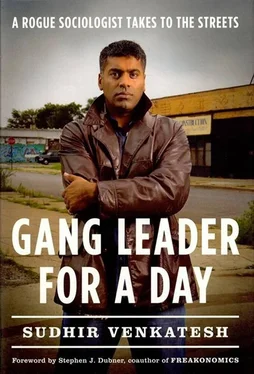Riding back to the South Side one night with J.T. from a suburban poker game, I sat quietly in the dark. J.T. was in a somber mood. As we pulled up to my apartment building, he admitted that the federal indictments were driving everyone a bit mad. “No one trusts nobody,” he said. “They’ll shoot you for looking funny.” J.T. shook his head. “I never realized how easy life was when it was just the projects. If they think I’m talking with the cops, I’ll be killed right away. Sometimes I think I should get my money and get out.”
As he said this, I immediately thought, I’d better get my data and get out! But I didn’t. I kept going back to the BK meetings. With the gang’s most senior officers talking to me, I figured I’d better be careful about how I chose to exit the group. As paranoid as everyone was these days, now was not the time for sudden movements.
J.T.’s life had also become complicated by the possible demolition of the Robert Taylor Homes. He was smart enough to know that his success was due in considerable part to geography: The concentration of people around Robert Taylor and its great location, near traffic corridors and expressways, guaranteed a huge customer base. J.T. might have been a good business-man, but every drug dealer in Chicago knew that Robert Taylor was among the best sales locations in the city.
So if the projects were torn down, J.T. would lose his customer base as well as much of his gang membership, since most of his young members lived in Robert Taylor.
Accordingly, J.T. was far less sanguine about the demolition than some tenants were. He thought it was folly to think that poor families could alter the buildings’ fate. Sometimes he’d just sit detachedly when we were together, muttering to himself, “Man, I need a plan. I need a plan. I have to think what I’m going to do…”
He also had to worry about retaining his senior leaders, Price and T-Bone. They, too, were getting anxious, since their best shot at success-and their biggest incentive to stay in the gang-was the opportunity to become a leader. If Robert Taylor was torn down, then J.T.’s stock would probably fall, and so would theirs.
When I asked T-Bone how he felt about the future, he soberly described his vulnerability as a lieutenant to J.T. “I’m not protected, that’s my main problem,” he said. “I got nothing, so I have to be real careful. I mean, I save my money and give it to my mom. Like I told you, I want to get my degree and do something else with my life, start a business maybe. But with all the police coming around, I got to be careful. It’s people like me who go to prison. The ones up on the mountain always strike a deal.”
But if he left the gang suddenly, I asked him, wouldn’t his bosses suspect he was collaborating with the police?
“Yeah,” he said with a laugh. “If I leave the gang, these niggers will come after me and kill me. If I stay in the gang, the police will throw me in jail for thirty years. But that’s the life…”
As his voice trailed off, I wanted to cry. I liked T-Bone, so much so that sometimes I almost forgot he was a gang member. At the moment he seemed like a bookish kid, working hard and worrying about passing his classes.
Not long afterward T-Bone’s girlfriend left a message instructing me to meet him at dusk in a parking lot near the expressway. I did as I was told. “You were always interested in how we do things,” T-Bone said, “so here you go.” He handed me a set of spiral-bound ledgers that detailed the gang’s finances. He seemed remorseful-and anxious. He wondered aloud what his life would have been like if he’d “stayed legit.” I could tell he was expecting a bad ending.
The pages of the ledgers were frayed, and some of the handwriting was hard to decipher, but the raw information was fascinating. For the past four years, T-Bone had been dutifully recording the gang’s revenues (from drug sales, extortion, and other sources) and expenses (the cost of wholesale cocaine and weapons, police bribes, funeral expenses, and all the gang members’ salaries).
It was dangerous for T-Bone to give me this information, a blatantviolation of the gang’s codes, for which he would be severely punished if caught. T-Bone knew of my interest in the gang’s economic structure. He saw how delighted I was now, fondling the ledgers as if they were first editions of famous books.
I never shared the notebooks with anyone in law enforcement. I put them away for a few years until I met the economist Steven Levitt. We published several articles based on this rich data source, and our analysis of the gang’s finances easily received the most notoriety of all the articles and books I have written. T-Bone probably had no idea that I would receive any critical acclaim, but he certainly knew that he was handing me something that few others-in the academy or in the world at large-had ever seen. Looking back, I think he probably wanted to help me, but I also believe he wanted to do something good before meeting whatever bad ending might have been coming his way. Given his love of books and education, it is not altogether inconceivable that T-Bone wanted this to be a charitable act of sorts, helping the world better understand the structure of gangland.
Perhaps the most surprising fact in T-Bone’s ledgers was the incredibly low wage paid to the young members who did the dirtiest and most dangerous work: selling drugs on the street. According to T-Bone’s records, they barely earned minimum wage. For all their braggadocio, to say nothing of the peer pressure to spend money on sharp clothes and cars, these young members stood little chance of ever making a solid payday unless they beat the odds and were promoted into the senior ranks. But even Price and T-Bone, it turned out, made only about thirty thousand dollars a year. Now I knew why some of the younger BK members supplemented their income by working legit jobs at McDonald’s or a car wash.
So a gang leader like J.T. had a tough job: motivating young men to accept the risks of selling drugs despite the low wages and slim chance of promotion. It was one thing to motivate his troops in the Robert Taylor Homes, where BK lore ran deep and the size of the drug trade made the enterprise seem appealingly robust. It would be much harder to start up operations from scratch in a different neighborhood.
I got to witness this challenge firsthand one evening when I accompanied J.T., Price, and T-Bone to West Pullman, a predominantly black neighborhood on the far South Side. Although there were poor sections of West Pullman, it also had a solid working-class base, with little gang activity. That was where the three Black Kings were trying to set up a new BK franchise. J.T. had arranged a meeting with about two dozen young men, a ragtag group of high-school dropouts and some older teenagers, most of whom spent the majority of their time just hanging out. J.T. wanted to help them become “black businessmen,” he told them.
They sat on wooden benches in the corner of a small neighborhood park. Most of them had boyish faces. Some looked innocent, some bored, and some eager, as if attending the first meeting of their Little League team. J.T. stood in front of them like their coach, extolling the benefits of “belonging to the Black Kings family, a nationwide family.” He pointed to his latest car, a Mitsubishi 3000GT, as a sign of what you could get if you worked hard in the drug economy. He sounded a bit like a salesman.
A few of them asked about the particulars of the drug trade. Were they supposed to cook the crack themselves, or were they provided with the finished product? Could they extend credit to good customers, or was it strictly a cash business?
“My auntie said I should ask you if she could join also,” one teenager said. “She says she has a lot of experience-”
Читать дальше












